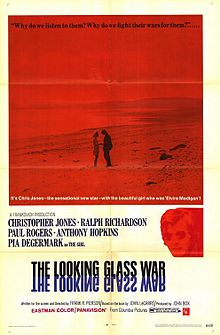
THE LOOKING-GLASS WAR
UK, 1969, 106 minutes, Colour.
Christopher Jones, Ralph Richardson, Paul Rogers, Anthony Hopkins, Pia Degermark, Susan George, Anna Massey, Vivian Pickles, Robert Urquhart, Timothy West.
Directed by Frank R. Pierson.
The Looking- Glass War is a version of a John Le Carre story, in the vein of his earlier work. The Spy Who Came in From The Cold. This film came at the end of the great spate of spy films and the spy films that spelt out the disillusionment with manipulation that goes into making spying the deadly game that it is. It is a good film, received good reviews, but did not do well at the box-office.
In fact, it is one of the better spy thrillers and certainly hammers home its point about the surface attractiveness and deeper ugliness of a looking-glass war, especially when manipulated by men who are still playing at their World War II peak. The film is photographed in looking-glass colours of grey, green, blue for England, but real colours for the outside world of Germany where spying, deaths, love, danger take place. Christopher Jones can act when he wants to (Wild in the Streets, Ryan's Daughter) and he does here. Anthony Hopkins at the start of his film career (Lion in Winter, A Doll's House) is a good foil. The select English cast are excellent. Frank R. Pierson (who wrote Cool Hand Luke) wrote and directed.
1. The title is obviously significant. To what does it refer? The looking-glass world of Alice was a back-to-front mirror of the real world in a dreamland. Is this relevant?
2. Note the use of mirrors, reflections, the use of blues, greens and silvers (mirror colours) and darkness, except for the scenes in Germany where yellows and bright white were used. This seemed to contrast the dark, unreal world with the colour of the real world. Is this relevant comment?
3. The music was not melodramatic but rather lazy brass rhythms. How did this add to the atmosphere of the film?
4. The film was a spy adventure. Was there more .to it? Were the details of the story well built up - the Finnish and Geneva segments, death of Taylor and the consequent activity from London?
5. What kind of man was the hero? He was said to be half mad? Was he? Why had he left his ship and come to England? Did he love his unborn child? Did his background - Polish, anti-German, etc., explain his attitudes?
6. Did the British have the right to use him as a spy, blackmail him?
7. What kind of men were the British -
- the Director and this theoretical war, living in the past, playing games?
- Haldane - emotionless, doing a job, ignorance of men, playing at war?
- Avery - a reflection of what the older men had been decades before, the only man with feelings and conscience and a sense of conflict?
8. How did the hero relate to these people?
9. The visit to his girl-friend? Love then revulsion and violence at the abortion? Did this mean he had no ties and doing the job was his own choice?
10. Getting into Germany - reality (and suspense) of getting through the wire whilst the British were safely in the hut?
11. Why did the hero kill the sentry and the truck-driver? Your reaction?
12. Once in Germany, with the training behind him, the world of cafe, trucks, cyclists ,seemed ordinary to us, but still menacing to him. What comment on the situation did this make?
13. Did he have any chance after the encounter with the soldiers? The missile going through the streets?
14. Why did he decide to transmit? Did the British know he was doomed? Avery's reaction stayed on the sound-track while the Germans were shown? Were both sides fighting looking-glass wars? How sad were the deaths? Why?
15. How ironic was the ending with the children finding the film and letting it fly in the spring sunshine? The whole enterprise was useless and based on error.
16. What comment on the world of spies, spying and its morality did the film make? Was it successful?